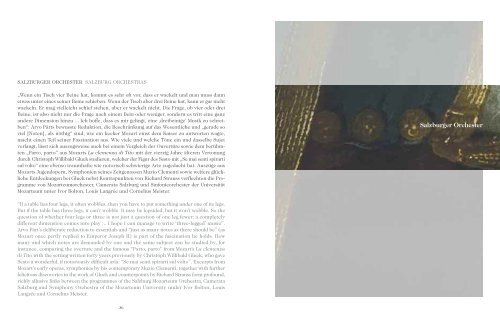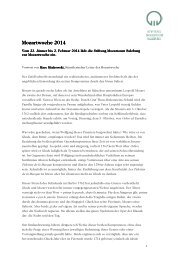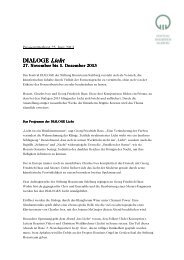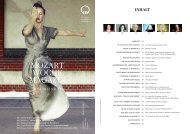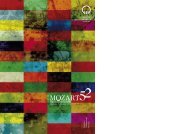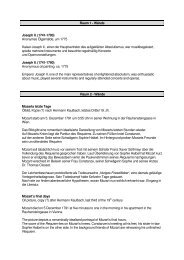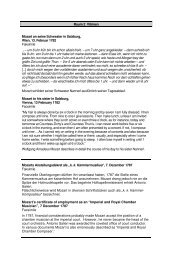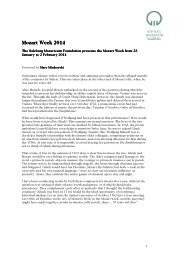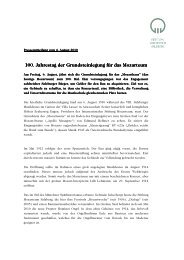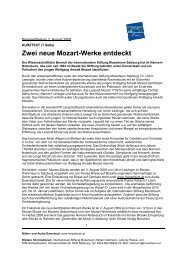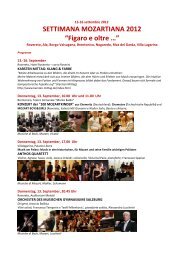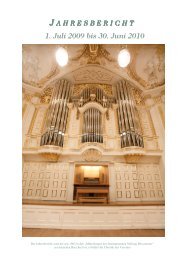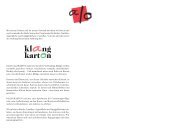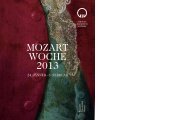Programm der Mozartwoche 2014 - Stiftung Mozarteum Salzburg
Programm der Mozartwoche 2014 - Stiftung Mozarteum Salzburg
Programm der Mozartwoche 2014 - Stiftung Mozarteum Salzburg
Erfolgreiche ePaper selbst erstellen
Machen Sie aus Ihren PDF Publikationen ein blätterbares Flipbook mit unserer einzigartigen Google optimierten e-Paper Software.
SaLzburGer orcheSter SaLzburG orcheStraS<br />
„wenn ein tisch vier beine hat, kommt es sehr oft vor, dass er wackelt und man muss dann<br />
etwas unter eines seiner beine schieben. wenn <strong>der</strong> tisch aber drei beine hat, kann er gar nicht<br />
wackeln. er mag vielleicht schief stehen, aber er wackelt nicht. Die Frage, ob vier o<strong>der</strong> drei<br />
beine, ist also nicht nur die Frage nach einem bein o<strong>der</strong> weniger, son<strong>der</strong>n es tritt eine ganz<br />
an<strong>der</strong>e Dimension hinzu ... Ich hoffe, dass es mir gelingt, eine ‚dreibeinige‘ Musik zu schreiben“:<br />
arvo Pärts bewusste reduktion, die beschränkung auf das wesentliche und „gerade so<br />
viel [noten], als nöthig“ sind, wie ein kecker Mozart einst dem Kaiser zu antworten wagte,<br />
macht einen teil seiner Faszination aus. wie viele und welche töne ein und dasselbe Sujet<br />
verlangt, lässt sich auszugsweise auch bei einem Vergleich <strong>der</strong> ouvertüre sowie dem berühmten<br />
„Parto, parto“ aus Mozarts La clemenza di Tito mit <strong>der</strong> vierzig Jahre älteren Vertonung<br />
durch christoph willibald Gluck studieren, welcher <strong>der</strong> Figur des Sesto mit „Se mai senti spirarti<br />
sul volto“ eine ebenso traumhafte wie notorisch schwierige arie zugedacht hat. auszüge aus<br />
Mozarts Jugend opern, Symphonien seines zeitgenossen Muzio clementi sowie weitere glückliche<br />
entdeckungen bei Gluck nebst Kontrapunkten von richard Strauss verflechten die <strong>Programm</strong>e<br />
von <strong>Mozarteum</strong>orchester, camerata <strong>Salzburg</strong> und Sinfonieorchester <strong>der</strong> universität<br />
<strong>Mozarteum</strong> unter Ivor bolton, Louis Langrée und cornelius Meister.<br />
<strong>Salzburg</strong>er Orchester<br />
“If a table has four legs, it often wobbles, then you have to put something un<strong>der</strong> one of its legs.<br />
but if the table has three legs, it can’t wobble. It may be lopsided, but it won’t wobble. So the<br />
question of whether four legs or three is not just a question of one leg fewer; a completely<br />
different dimension comes into play ... I hope I can manage to write ‘three-legged’ music”.<br />
arvo Pärt’s deliberate reduction to essentials and “just as many notes as there should be” (as<br />
Mozart once pertly replied to emperor Joseph II) is part of the fascination he holds. how<br />
many and which notes are demanded by one and the same subject can be studied by, for<br />
instance, comparing the overture and the famous “Parto, parto” from Mozart’s La clemenza<br />
di Tito with the setting written forty years previously by christoph willibald Gluck, who gave<br />
Sesto a won<strong>der</strong>ful, if notoriously difficult aria: “Se mai senti spirarti sul volto”. excerpts from<br />
Mozart’s early operas, symphonies by his contemporary Muzio clementi, together with further<br />
felicitous discoveries in the work of Gluck and counterpoints by richard Strauss form profound,<br />
richly allusive links between the programmes of the <strong>Salzburg</strong> <strong>Mozarteum</strong> orchestra, camerata<br />
<strong>Salzburg</strong> and Symphony orchestra of the <strong>Mozarteum</strong> university un<strong>der</strong> Ivor bolton, Louis<br />
Langrée and cornelius Meister.<br />
36


